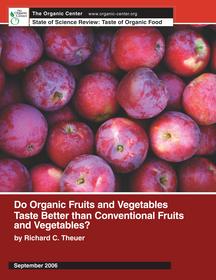Contact Information: Media Contact: Amy Summers 727-848-1618 ext. 202 Email Contact Pitch Inc.
Organic Satisfies the Palate
State of Science Review Shows Why Organic Produce Tastes Better
| Quelle: The Organic Center
FOSTER, RI -- (MARKET WIRE) -- March 16, 2007 -- Demand for organic foods is on the rise as a
healthier choice, but some "food lovers" are skeptical when it comes to
taste.
Taste plays a huge factor in converting consumers to try new foods and
according to a Minnesota Opinion Research Inc. poll, 43 percent of
consumers say taste is a major reason why they purchase organic fruits and
vegetables. So what are the other 57 percent waiting for?
"People have a lot of misconceptions about what an organic meal tastes
like," says celebrity chef Akasha Richmond. Eighty-five to 90 percent of
the ingredients she uses in her A-list recipes are organic. "Because
organic is associated with something that is good for you, people think it
will be too healthy and have no taste. But after they try it, most people
are shocked at how much more flavor some of their favorite foods have."
And while chefs like Richmond have known instinctively for years that
organic produce can add flavor to their menus, a new state of science
review, published by The Organic Center, shows why organic fruits and
vegetables often taste better.
Published studies have analyzed the sensory appeal of organic fruits and
vegetables compared to their conventional counterparts.
Organic fruits and vegetables tend to score higher in taste because they
are sweeter than conventionally grown foods. Scientists say this is because
of the nutrient density of organic produce and their smaller size.
Conventional farming methods are designed to produce bigger fruits and
vegetables, but increasing cells size adds more water, diluting the
concentrations of both vitamins and natural flavors.
Organic apples, strawberries and tomatoes showed some of the most
significant differences in taste, according to the report.
The report also dispels another misconception about freshness. Contrary to
what most people believe, organic fruits and vegetables often have a longer
shelf life than conventionally grown foods. The higher levels of
antioxidants, considered a natural preservative, are actually part of what
enables some organic fruits and vegetables to store longer. The other
contributing factor is the lower levels of nitrates that come from
synthetic fertilizers, which aren't used in organic farming.
Science is showing that organic fruits and vegetables not only taste
better, but they are better for you. Nutrient content in organic fruits
and vegetables is, on average, higher than in conventionally grown fruits
and vegetables. In many cases, the amount of antioxidants found in organic
fruits and vegetables is 30-percent higher compared to conventionally grown
produce. To get a copy of the taste state of science review, go to
http://www.organic-center.org and visit http://www.MO2010.org to find out
how you can make a difference by just eating 10-percent organic.
